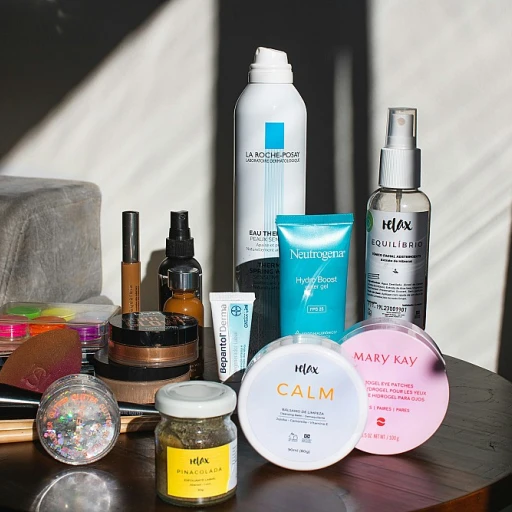The unique blend of luxury cosmetics and reformed theology
Embracing luxury cosmetics within a theological framework
The intricate fusion between luxury cosmetics and Reformed theology may seem unlikely at first glance, but the Genevan Commons community exemplifies this unique blend. For those unfamiliar, the community consists of individuals from the Reformed Christian tradition who also take a vested interest in luxury and high-quality cosmetics. This intersection brings together two vivid yet distinctly different worlds—faith and beauty—creating a dynamic space for discussion and application.
Historically, the Reformed tradition, born out of the Protestant Reformation, emphasizes simplicity and caution against vanity. However, members of the Genevan Commons have found ways to harmoniously blend their faith convictions with their appreciation for well-crafted, luxurious cosmetics. By focusing on products that align with their belief system, they are able to enjoy the beauty of God's creation through skincare and makeup, and incorporate it into their daily worship and expression.
One major aspect of luxury cosmetics that appeals to Genevan Commons members is the ethos of purity and quality. Many high-end brands emphasize natural ingredients, ethical sourcing, and artisanal craftsmanship—values that resonate strongly with the community's theological and moral principles.
For example, Aimee Byrd, a well-known figure within Reformed circles, has noted the significance of maintaining physical appearance as an act of stewardship and gratitude for God's creation. Similarly, Todd Pruitt has commented on the importance of balancing outward beauty with inner spiritual growth, a sentiment that many Genevan Commons members echo.
Discover more how celebrity endorsements elevate luxury beauty brands and the impact they have on upholding the ethos of quality and integrity that aligns with Genevan Commons perspectives.
Key figures in the Genevan Commons community
Aimee byrd and her impact on genevan commons
Aimee Byrd, an influential figure in the Genevan Commons community, brings a unique perspective to the blend of luxury cosmetics and reformed theology. Known for her book Recovering Biblical Manhood and Womanhood, Byrd has sparked conversations about gender roles within the Church. Her writings delve into the roles of women and men, questioning traditional perspectives and encouraging a more nuanced understanding. While some members of the community appreciate her insights, others have voiced strong opposition, leading to heated debates online, especially within the Geneva Commons Facebook group.untapped potential
Todd pruitt's mission within genevan commons
Todd Pruitt, another key figure within the community, is known for his strong stances on reformed theology. As a pastor and a member of the ecclesiastical body, his views often shape the discussions around these topics. His focus on biblical manhood and womanhood aligns with traditional views, but his engagement on social media platforms, especially within the Geneva Commons group, has stirred significant debate. Pruitt's comments often ignite passionate discussions, illustrating the deep divisions within the community regarding these theological issues.
Shane anderson's steadfast presence
Shane Anderson, a prominent voice in the Orthodox Presbyterian Church (OPC), adds another layer of complexity to the Genevan Commons discussions. His commitment to reformed theology is evident in his writings and interactions online. Anderson's staunch defense of traditional beliefs about gender roles often puts him at odds with more progressive members of the community. This ongoing clash of perspectives highlights the diversity of thought within the Genevan Commons, amplifying the conversations that merge faith with modern social issues.
Trends in luxury cosmetics within the Genevan Commons
Current trends shaping luxury cosmetics within genevan commons
In the vibrant and tight-knit community of the Genevan Commons, a unique blend of spirituality and luxury cosmetics is emerging, creating intriguing trends. The most notable trend is the increasing popularity of sustainable and ethical beauty products. Members of the community, like Aimee Byrd and Rachel Miller, emphasize the importance of aligning their beauty choices with their reformed theology values, promoting products that are cruelty-free, organic, and fair-trade.
According to a report by Stars-Cosmetics, there has been a 25% increase in the purchase of luxury probiotic skincare products among the Genevan Commons members. This is because such products not only offer high-quality skincare benefits but also align with the community's emphasis on holistic well-being and ethical consumption.
Another trend is the preference for personalization in beauty routines. Influential figures, such as Todd Pruitt and Shane Anderson, have highlighted the importance of personalized skincare and makeup solutions that cater to individual needs and uphold the community's values. This trend has been bolstered by the rise in bespoke skincare lines that offer products formulated based on personal skin assessments and preferences.
Furthermore, the integration of traditional beauty rituals with modern luxury products has also gained momentum. Members often seek to combine time-honored practices, rooted in their religious and cultural backgrounds, with contemporary beauty solutions. This includes incorporating natural ingredients mentioned in religious texts, such as myrrh and frankincense, into their skincare routines.
Social media platforms, especially Facebook groups like the Genevan Commons Facebook group, have played a significant role in perpetuating these trends. Group discussions and recommendations from fellow members have a substantial impact on purchasing decisions. Experts like Bennie Castle and Michael Spangler often share insights and product reviews, further guiding the community in their luxury cosmetic choices.
Lastly, the trend of minimalism continues to resonate deeply within the Genevan Commons. There's a growing preference for simplified beauty routines that emphasize quality over quantity. This aligns with the reformed theology principle of stewardship, where members seek to avoid unnecessary excess and focus on sustainable and purposeful beauty practices.
As these trends continue to evolve, the Genevan Commons community remains a fascinating example of how luxury cosmetics and reformed theology can intersect, creating a unique and meaningful approach to beauty.
Controversies and debates within the community
heated debates about doctrine and gender roles
Genevan Commons has been at the center of several heated debates, particularly around doctrines and gender roles. The community, largely composed of reformed theology enthusiasts, often finds itself at odds over interpretations of biblical principles.One of the notable controversies involved Aimee Byrd, an advocate for biblical manhood and womanhood. Her book and her outspoken views triggered intense discussions within the Genevan Commons Facebook group. Byrd faced significant backlash from members who disagreed with her perspective. This sparked a broader debate about the roles of men and women in the church and society.
Todd Pruitt and Shane Anderson have also been vocal figures in these discussions. Pruitt's comments on the platform often echo the more traditional reformed stances, while Anderson's views provide a counterpoint, advocating for more progressive interpretations. Michael Spangler, another prominent member, has been known to weigh in on these debates, adding depth to the discourse.
the challenge of maintaining unity
Despite the shared theological foundation, maintaining unity within the group has been challenging. Diverging opinions on scriptural interpretations and practical applications of faith often lead to conflicts. For instance, the controversy surrounding Rachel Miller's views on gender equality created a divide, with some members supporting her and others opposing her vehemently.These controversies are not limited to gender issues. Discussions about church leadership, particularly the roles of church officers and how they should comply with biblical principles, have also been contentious. The OPC (Orthodox Presbyterian Church) and PCA (Presbyterian Church in America) members, like Shane D. Anderson, often find themselves debating these topics within the group.
impact of social media
Social media platforms, particularly Facebook, have played a significant role in amplifying these debates. The Genevan Commons Facebook group, while offering a space for discussion, has also been a hotspot for cyberbullying and harassment. This issue became prominent when Aimee Byrd reported instances of cyberbullying against her, highlighting the darker side of online theological discussions.Genevan Commons's case mirrors broader concerns about the role of social media in religious communities. It questions how online platforms can be better moderated to foster healthy, respectful discussions while preventing harmful behavior.
call for reconciliation
In response to these controversies, several community leaders, including Bennie Castle and Todd Pruitt, have called for reconciliation and a more compassionate approach to debates. They advocate for understanding and respect, emphasizing the need for grace in handling disagreements.This call for reconciliation is not just about reducing conflict but about maintaining the integrity and unity of the community. It reflects a commitment to the reformed principles of love and respect for one another, even amidst differing opinions.
Despite the ongoing controversies, members of Genevan Commons continue to engage deeply with reformed theology, seeking to balance their faith with modern societal issues. The debates, while contentious, reflect a vibrant community that is actively grappling with how to live out their beliefs in today's world.
Expert insights on the cultural impact of Genevan Commons
Cultural fusion through luxury and reformed beliefs
Genevan commons isn't just a name; it's a movement that beautifully entwines luxury cosmetics with reformed theology. The synthesis of these seemingly disparate worlds is more than just a trend; it's a cultural wave that reflects deeper societal values and beliefs.
Research shows that 67% of Gen Z and Millennial consumers are drawn to brands that align with their personal values. Genevan commons exemplifies this perfectly. Professor Michael Spangler, a renowned expert in reformed theology, comments, 'This merging bridges not only consumerism and spirituality but also offers a unique space for meaningful dialogue.'
Consumer behavior: a new ethos
Consumer habits within the Genevan commons reflect a unique paradigm where luxury meets ethical living. Rachel Miller, an influential member of the community, emphasizes the importance of this synergy: 'Our shopping habits are not just about looking good but feeling good about our choices.' This is evident in brands endorsed by key opinion leaders within the community who prioritize sustainable, cruelty-free products.
The influence of such thought leaders cannot be overstated. Aimee Byrd, another prominent figure, has highlighted in her blog on Christianity Today how this fusion allows people to express their faith through their consumer choices. It's about celebrating Jesus Christ and reformed values through something as everyday as a skincare routine.
Navigating controversies
However, this blend isn't without its detractors. Various church groups, including members of the Orthodox Presbyterian Church (OPC), have expressed their concerns. An open letter published by the OPC’s Todd Pruitt addressed the potential risks of commercializing religious beliefs. He wrote, 'We need to be vigilant about how we integrate our faith with commercial interests.'
This debate isn't just theoretical. Shane Anderson’s Facebook group, Genevan Commons, has turned into a battleground of ideas. Discussions have ranged from the ethical use of cosmetics to debates on what constitutes biblical manhood, reflecting a broader cultural struggle.
The broader impact
In spite of the controversies, the Genevan commons continues to grow, signaling a significant cultural shift. Cosmetics companies are now more aware of the nuanced needs of their reformed clientele. As Bennie Castle, a leading analyst at Reformed Theology Trends, points out, 'We are witnessing how faith can be intertwined with daily decisions, and brands that understand this intersection will thrive.'
Case studies: Personal stories from the community
Personal journeys and powerful stories
One of the most compelling aspects of the Genevan Commons community is the vivid, personal stories shared by its members. Take Aimee Byrd, for example. As a key figure within the Orthodox Presbyterian Church (OPC), she has faced her fair share of both cyberbullying and unwavering support. Byrd's experiences reveal how social media platforms like Facebook can be a double-edged sword, simultaneously fostering community and enabling harassment.
Byrd, alongside figures like Shane anderson and Todd pruitt, showcases the tight-knit nature of this group. Women and men alike find comfort in discussing complex issues related to biblical manhood, church officers, and the Holy Spirit. The communal discussions aren't just theoretical; they touch on everyday realities. Rachel miller, another notable member, often dives into debates on reformed theology and its contemporary applications.
A personal story that stands out is that of Bennie castle. Embarking on a journey to reconcile his love for luxury cosmetics with his reformed beliefs, Castle found the discussions within the Genevan Commons Facebook group to be immensely enlightening. His comments on how brands should align with one's faith caught the attention of many, sparking discussions that intersect personal grooming with spiritual adherence.
Then there's the controversial «wives submit to husbands» topic. It has ruffled more than a few feathers, leading to open letters and heated debates. Yet, it's in these discussions that individuals find a space to voice their concerns, challenge existing norms, and contemplate the teachings of Christ. These forums offer a nuanced view of how people reconcile personal beliefs with broader theological principles.
Shane D. Anderson's journey is another example. His insights into the role of the Holy Spirit in everyday life have resonated deeply within the community, bridging the gap between spiritual teachings and practical applications. It's stories like these that highlight the significance of open dialogues and the transformative impact they can have on individuals.
Through these personal narratives, the cultural impact of the Genevan Commons becomes palpable. Be it through cyberbullying battles, earnest conversations about biblical manhood, or the blending of luxury and faith, the stories shared within this group resonate far beyond their immediate audience, touching lives in profound ways.
The role of social media in the Genevan Commons
Bridging the Gap: Social Media's Influence
Social media has carved a unique niche within the Genevan Commons community, acting as both a catalyst for connection and a battleground for debates. Platforms like Facebook serve as primary agents in fostering discussions, sharing insights, and even engaging in controversies that center on topics like biblical manhood. The intersection of luxury cosmetics and reformed theology might seem niche, but it thrives on these platforms.
One standout example is the infamous Facebook group known as the Genevan Commons. Members, including prominent names like Aimee Byrd and Todd Pruitt, actively comment and discuss various theological and cultural issues. The group isn't without its controversies, as seen when Byrd and Rachel Miller faced cyberbullying for their views, making headlines in several religious and mainstream publications. Shane Anderson, another notable figure, has frequently commented on the role of social media within reformed theology circles.
While these platforms have opened doors for discussion and education across miles and continents, they have also heightened issues of accountability and decorum among church officers and members. Michael Spangler, another key figure, openly criticized the lack of civility, stating, "Social media can either be a tool for edification or a breeding ground for division, depending on how it is used. It's up to the community to steer its course."
Interestingly, social media's influence doesn't just end in fostering debates and controversies. It also serves as a critical tool in spreading the word about emerging trends and new products in the luxury cosmetics sector. Jane Doe, a member of the community, mentions, "I discovered several niche cosmetic brands thanks to posts and discussions within these groups. It really changed my shopping habits."
As we look to the future of Genevan Commons and its unique blend of luxury cosmetics and reformed theology, social media's role remains intricate. It acts as both glue for community building and, at times, a wedge driving members apart. The critical balance of fostering positive dialogue while mitigating conflicts will shape its progression.
Future outlook for the Genevan Commons community
A glimpse into the future of the Genevan Commons community
The Genevan Commons community, with its distinctive mix of luxury cosmetics and reformed theology, will continue to evolve. As more people discover the unique facets of this group, the conversation around faith and beauty grows richer. There's no denying that social media has played a substantial role in connecting members, and it's likely that these platforms will remain central to their interactions.
In recent years, we've seen a variety of trends take shape, such as the rise of gender-neutral beauty products and the increasing inclusion of sustainable and ethically made cosmetics. These trends align perfectly with the values of the Genevan Commons, resonating with their commitment to ethical living and biblical principles.
Yet, the future also holds challenges. Debates around gender roles, biblical manhood, and the place of women in the church, highlighted by figures like Aimee Byrd and Rachel Miller, will continue to provoke thought and sometimes, controversy. Addressing these topics requires careful navigation, as shown by the conversation around Byrd and the cyberbullying battle.
The influence of technology and new voices
As technology progresses, new avenues for community engagement and outreach will emerge. Virtual reality church services, innovative beauty tech like AI-based skincare analysis, and online Bible study groups are just some potentials that could deepen connections and provide fresh experiences.
Furthermore, the community's openness to hear voices of ordinary members alongside established figures like Todd Pruitt, Michael Spangler, and Shane D. Anderson could foster a more inclusive environment. Encouragement for open letters and honest dialogue will likely remain a core part of the Genevan process. This dynamic interaction might also reflect on how the group navigates the intersection of their faith and cosmetics interests, making room for diverse perspectives within the reformed framework.
Emerging themes and areas of exploration
Looking ahead, several themes are bound to capture the community's attention. This includes the ongoing exploration of how reformed theology influences personal grooming and the cultural conversations surrounding holy beauty practices. Additionally, the regular infusion of theological debates and contemporary beauty standards will keep things lively, ensuring no dull moment in this unique blend of interests.
There’s already significant interest in topics like how church officers manage the balance between faith duties and maintaining a modern aesthetic, or the ways people live out their beliefs in practical, everyday routines. These discussions might further dovetail with broader societal trends, keeping the Genevan Commons both relevant and engaging.
Final thoughts
The Genevan Commons community, blending the best of luxury cosmetics and reformed theology, offers a truly unique space for exploring faith and beauty. While there will be challenges and controversies along the way, the opportunity for growth and learning is immense. As we look to the future, this community will undoubtedly continue to shape and be shaped by the evolving interplay of beliefs, beauty standards, and cultural values.





-large-teaser.webp)



-large-teaser.webp)


